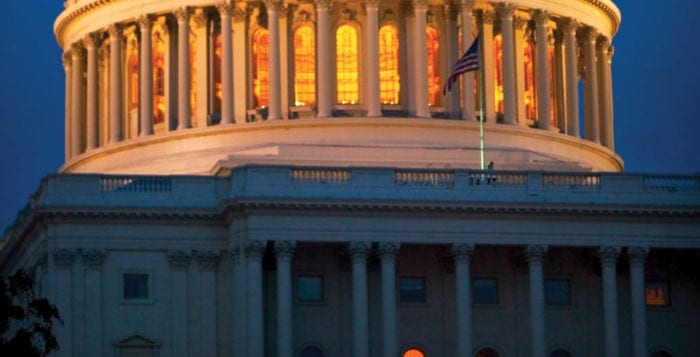Open Mike: America the Hopeful
By Michael Tessler
America at its finest has always been a series of contradictions. We are a democracy, but not directly. We are a republic, but not entirely. We are capitalists, but not wholly. We are free, but not always. America has never been an absolute anything and I think with good reason.
All one must do is look toward the grand and gleaming white rotunda of our Capitol Building, adorned with a bronze statue of Freedom, to see the irony of our union. Though an uncomfortable truth, the epicenter of freedom and democracy in the world was built by those who were not free. Slavery is a stain on our nation. Some would rather ignore its uncomfortable truths, refuse to acknowledge its lasting impacts, and remain blind to the errors of our past. Others choose to let its singularity define us.
In the modern era (and in most eras), there are those who comfortably hide behind our flag. They refuse to acknowledge its shortcomings, believing that somehow our imperfections make us weak and/or dilute the idea of America itself. Others have given up on the idea of our nation altogether and have subscribed to the self-deprecating belief that America is a sham, that our misdeeds are too plentiful to salvage our republic.
One question, in particular, uncomfortably encapsulates this whole concept and in a lot of ways the modern American conflict: Can George Washington still be considered a great man if he owned slaves?
This is an unsettling question for some. Personally, I have always viewed him as an almost God-like figure. Who against all odds led an army of ragtags to victory over the world’s greatest superpower? Who had the opportunity to rule for life and establish a monarchy but rather ensured the peaceful transition of power and secured the blessings of liberty for generations to come? Somewhere in the back of my mind I knew he owned slaves. That was a fact I wanted to ignore. More than anything I didn’t want to second guess the pureness of my personal hero, our nation’s first president, a man I had placed on a pedestal of great renown.
Yet, we are doing our country a disservice if we remain blind to uncomfortable truths: George Washington owned more slaves than any other American president — 318 slaves at the time of his death. For perspective, that is roughly the same population as the freshman, sophomore and junior classes of Port Jefferson High School combined.
“Everyone had slaves back then!” is an argument I’ve often heard. You don’t need to look any further than to John Adams or Alexander Hamilton to know there were mainstream abolitionist. Many recognized that slavery was a misdeed, a criminal act even. This fact is a source of great contention among Americans, but I think both sides are the missing the point.
The greatest accomplishment of our nation’s forefathers was their creation of a system of government that would allow future Americans to correct their sins. Using their model, we have successfully abolished slavery and Jim Crow laws, given women and African Americans the right to vote, landed a man on the moon, defeated the Third Reich, created the most professional and well-trained military, built great cities, and fostered the education of the world’s most renowned thinkers, inventors and dreamers.
Our Capitol Building, while built by slaves, is the very same building in which their freedom was finally granted. Progress isn’t always easy, and the work of it is never truly done. In a nation that abhors absolutes, it strikes me as a great misstep to allow absolutists to define us.
George Washington means many things to many people, his entire existence perhaps symbolic of the American story. After his death, he had granted his slaves their most basic right to freedom. After his death, the system of government he helped create would forever grant slaves their basic right to freedom.
Like many, President Washington feared that the abolition of slavery would rip our young country apart. Those fears were not ill founded, as our country did tear apart during the brutal American Civil War. We as individuals must come to our own conclusion, but to reduce our complex history to a series of absolutes strikes me as an injustice to history itself.
America’s genius was not crafted in a single summer day in Philadelphia. It was earned through trial and error, war and bloodshed, broken bloodied chains and crackled whips and the tireless debate and civil discourse of the American people.
We are a dynamic and ever-changing people. Our sins do not define us, but that does not absolve us of them either. We must face the repercussions of our actions as a collective. Abraham Lincoln fought the war George Washington could not, just as we today are forced to confront the conflicts our fathers and forefathers could not.
We did not want to inherit these struggles, no generation does, but how we choose to move forward is what truly makes us American. Our ability to embrace our imperfections and strive ever forward in spite of them, with the endless dream of achieving a more perfect union. Now that is America the Beautiful.
On Nov. 8, please honor our servicemen and women by casting your ballot. Feel free to share your thoughts with me at [email protected].







